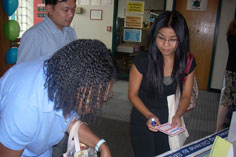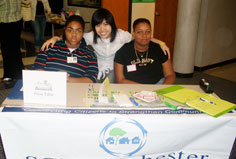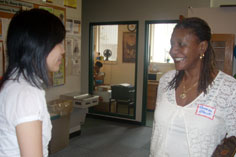On the Web, a new home for Dot dwellers
Dan Devine
While people have come to use the Internet in many different ways since its explosion into mainstream culture, the technology has first and foremost been a tool that connects people by reaching across national, social and cultural boundaries.
Marisa Luse is looking to tap into that spirit, but the site director of Social Capital Inc. (SCI) Dorchester is narrowing her focus in the hopes of making her community stronger, safer and more socially active.
Though the site was officially launched in December, Luse and the folks behind www.mydorchester.org — billed as the neighborhood’s first official community Web portal — recently held a “kick-off conference” to call attention to the next phase in their “Connecting the DOT” campaign: getting community residents to sign on and become part of the conversation.
“Part of the idea is to take the popular social networking Web technology used on sites like MySpace, Facebook and others that say they are about building community,” said David Crowley, president of Social Capital Inc., SCI Dorchester’s parent organization. “The idea is to really apply those concepts to a local community. It can be a way to help people meet and exchange ideas, and they can use it as a collaborative tool to get together on community issues.”
Crowley said the project has “ramped up a couple of notches” during the summer, thanks to the work of six young people responsible for making the site the one-stop online destination for all things Dorchester.
Through the “Opportunity for Unity Collaborative,” established by the Boston Globe Foundation to provide funds to programs working on community projects for teens and children in Dorchester’s Bowdoin-Geneva neighborhood, SCI Dorchester hired six young Dorchester Outreach Team (DOT) Leaders in July to work on the MyDorchester.org site.
During the two-month program, the Leaders, who come from diverse ethnic backgrounds and range in age from 18 to 21, develop both high-tech and old school skills. They learn Web development, content creation and management while also doing the grassroots work of pounding the pavement and knocking on doors in Bowdoin-Geneva, Codman Square and Fields Corner to get the word out about the online campaign.
All the information that users need to enter to sign up on MyDorchester.org are an e-mail address, a name and the Dorchester neighborhood they call home — and the site is even willing to extend its boundaries on that, allowing non-residents to log in as a “Friend of Dorchester.”
It’s important to allow outsiders the freedom to join, Luse said, because while the site’s primary goal is creating a closer-knit Dorchester, its creators also want to make sure that residents of other communities see how many great things Dorchester has to offer.
“This is just a forum and a tool for people to build community in a bigger way, and not only just touch the people that live in this neighborhood, but touch the lives of those who live outside of it and may be questioning it or looking at this neighborhood through a negative lens,” she said.
While the Leaders hope that the opportunity to be part of something positive will be enough to convince some new users to sign up, they also realize that others are more apt to respond if they can win something in the process. Anyone who subscribes to the site and posts their own content is eligible for a weekly prize, and the more you post, the more chances you have to win. Prizes include gift certificates and gift cards, an iPod, a digital camera and more.
But prizes alone won’t drive up membership numbers — by summer’s end, the Leaders hope to get 500 new users registered — if the site doesn’t give visitors content that they want to read or provide them the chance to make their voices heard. MyDorchester.org tries to address both issues by offering users both the practical and the pleasurable.
On the practical side, the site’s community guide acts as an interactive database of community resources and organizations, where users can comb through listings to find groups or services that fit their particular neighborhood and needs — whether it’s an after-school program for a seven-year-old in Codman Square, disability services for an elderly family member in Fields Corner or volunteering opportunities in Savin Hill.
Straddling the line between functional and fun are the community calendar, a day-by-day listing of events, activities and other local happenings, and the “DOT Board,” a catch-all bulletin board and home for anything Dorchester-related — classified ads, restaurant reviews, information on how to contact the Boston Police Department’s Crime Stoppers Unit, a note about available office space in Lower Mills, even “a tip for how to avoid getting caught in Dot Ave traffic,” according to the site.
More squarely on the leisure side are the site’s user-created blogs, video content from the Dorchester Youth Council and “DOT Shots,” which showcases photos taken by residents of their favorite moments, scenes or places in the neighborhood.
As their fellow residents start to visit the site to check out the content already posted, the DOT Leaders are hard at work developing new features that they think will have newcomers sticking around awhile once they’ve arrived. Recent additions include the “Citizen of the Week,” a spot where any Dorchester denizen can be recognized for a random act of kindness or a particularly good deed, and the “Social Butterfly” page, spotlighting the user that has posted the most content to MyDorchester.org in the past week.
Crowley characterized the Web initiative as “a great win-win” that benefits both the Dorchester community and the individuals involved in the summer project.
“We often focus on the need we’re meeting by providing an avenue for the people of Dorchester to gather, share and build community, but the project is also very much about the skills we’re helping these young people develop,” he said. “Technological skills are very marketable right now, and the DOT Leaders are learning about marketing, about content management, a little bit of Web design work, etc., at the same time as they’re doing something positive for their neighborhoods.”
Commitment to community action is at the heart of the theory that gives Social Capital Inc. its name.
The concept of social capital has been kicking around in some form or another for nearly a century. But its use by Harvard University sociology professor Robert D. Putnam in his 1995 journal article “Bowling Alone,” and later in his 2000 book of the same name, brought the notion newfound popularity.
Though some may debate the term’s exact definition, Luse describes social capital simply as the belief “that relationships matter — that it’s important for people to be connected to one another and involved in their community.”
While the concept itself is positive, Putnam’s work painted a somewhat dire portrait of American society, focusing on the decline of social capital and civic participation over the past 25-plus years and citing a litany of factors as proof — flagging voting figures, membership rates in national organizations, attendance at local meetings and religious services, and even drops in the frequency with which people have friends over for dinner.
Individually, those examples may seem inconsequential. But taken together, Putnam and others argue, they show that Americans are becoming increasingly insular.
“There are a lot of things that are distracting us, and our communities are suffering as a result,” said Luse. “People don’t know their neighbors anymore, they’re not as involved in local issues as they once were — the list goes on and on.”
Seeking to stem that tide one community at a time, Social Capital Inc. was founded in 2002, developing an engagement model in Woburn and looking for opportunities to bring that blueprint to other neighborhoods in need of a civic shot in the arm.
In March 2004, Dorchester became SCI’s first expansion site, and a little more than three years later, Luse and the Leaders believe their Web site is the next step toward weaving together their community’s many disparate strands into a cohesive and positive whole.
But to make the most out of the new community-building tool, they say, they need their neighbors to take a step of their own and buy into the idea that the site can make a difference.
“I’m sure that you can think of another way we need to connect our community, too,” said DOT Leader Taquisha Albert, who served as the master of ceremonies at the recent kick-off conference. “We need your help to build this online community.”
“We know we’ve got a lot of ways that we can go, and right now we’re looking for people to come on in and help — to tell us what they want and how they want to get connected to their community,” said Luse. “That’s why the site is called ‘My Dorchester.’”
|
|
Attendees sign in at the reception desk at a kick-off conference held July 19 to raise awareness of and interest in www.mydorchester.org, Dorchester’s first official community Web portal. (Photo courtesy of SCI Dorchester)
|
(Top) (From left): Dorchester Outreach Team (DOT) Leaders Grace Ejiwale and Linh Tran and Shayna Wallace staff the press table at the July 19 kick-off conference for www.mydorchester.org. (Photo courtesy of SCI Dorchester)
(Bottom) DOT Leader Tran (left) greets Theresa Albert of DOT Cares at the conference. Tran and her fellow DOT Leaders are creating new content and features for www.mydorchester.org, as well as reaching out to residents in the streets to get the word out about the site. (Photo courtesy of SCI Dorchester) |
|




